Bring Home the Turkey
What could be better than an amazing Turkish meal? Buying Turkish delicacies to bring home, of course!
• Eta Bal (website is Turkish only). This small store in Kadiköy is dedicated to honey and honey only—sweet dreams, Pooh Bear. Just a few store fronts away from Çiya on Güneşlibahçe street, we were almost sidetracked by the beauty of the honey before we'd even had lunch.
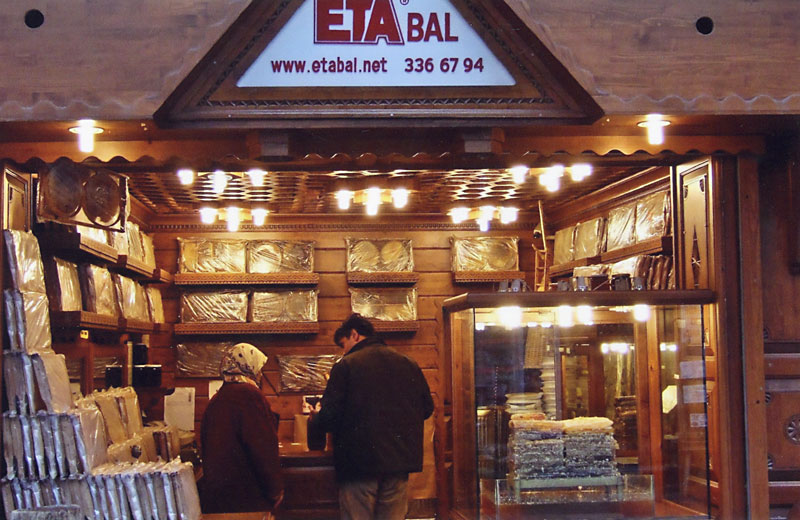
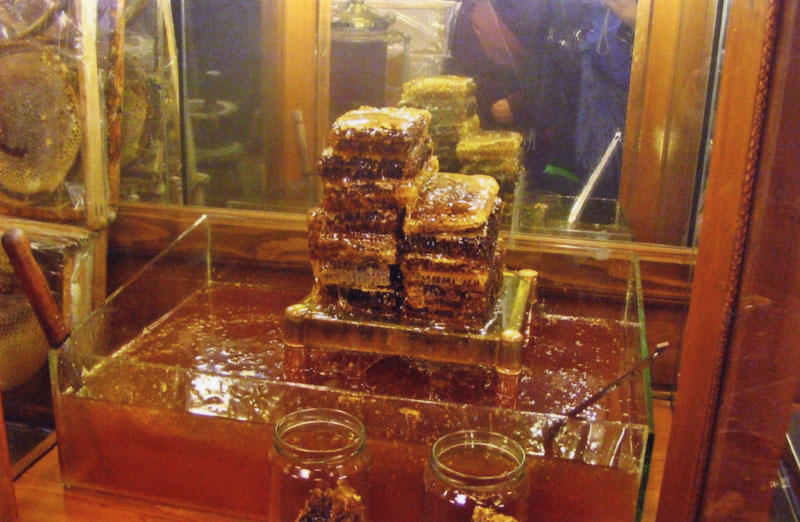 Two large display cases are filled with different grades of honey, a golden tower of honeycombs stacked in the center of each. The walls are lined with honeycombs for purchase. The store's owner revels in the drawing power of his products; from the moment we entered, he said delightedly, "I will be very rich man in 10 minutes." He was right.
Two large display cases are filled with different grades of honey, a golden tower of honeycombs stacked in the center of each. The walls are lined with honeycombs for purchase. The store's owner revels in the drawing power of his products; from the moment we entered, he said delightedly, "I will be very rich man in 10 minutes." He was right.
His English sufficed to tell us the honey came from Karakova, but not enough to explain the differences in grades. Luckily we were allowed a sampling!
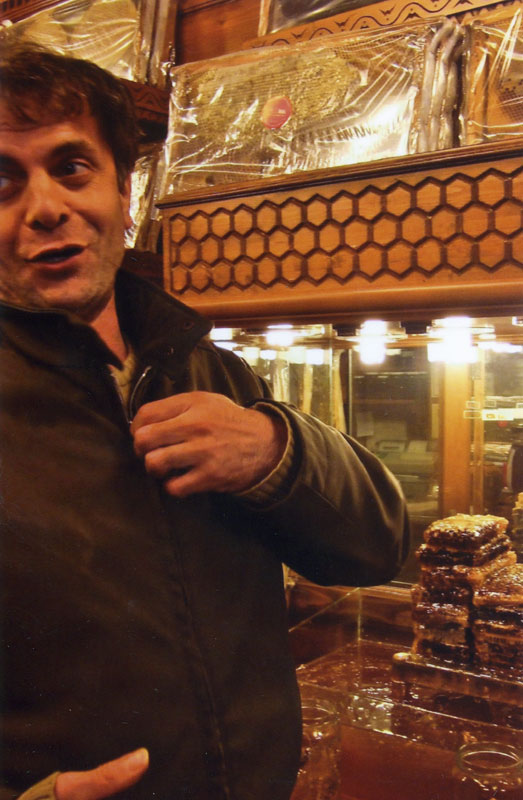 Priced by the kilo, the 18YTL version was one of the most deliciously gooey honeys I've ever tasted. The darker 56YTL managed to edge it out, but we decided it was an unnecessary splurge. A tantalizing small jar on the side was filled with a deep brown substance labeled "108YTL." 108YTL?!!
Priced by the kilo, the 18YTL version was one of the most deliciously gooey honeys I've ever tasted. The darker 56YTL managed to edge it out, but we decided it was an unnecessary splurge. A tantalizing small jar on the side was filled with a deep brown substance labeled "108YTL." 108YTL?!!
We were almost ashamed to beg for tastes of such an expensive honey—almost. If molasses taffy could be combined with dark maple syrup, it might taste something like 108YTL honey.
Grinning, the owner theatrically scooped the honey over the tower of combs; we drooled as it oozed its way back down to the reservoir below. He met no resistance—we each walked out with at least 2 half-kilo jars.
• Malatya Pazari (website is Turkish only). Misir Çarşisi, aka the Egyptian Bazaar aka the Spice bazaar, is located behind the New Mosque in Eminönü in a lovely L-shaped building. We came in search of powdered salep and true to its name, most of the nearly-identical stalls sold spices. At first it seemed like basically a scaled-down version of the Grand Bazaar, but with even more harassment and less selection.
But then we discovered Malatya Pazari. This grouping of 3 shops at the corner of the "L" are owned by the loveliest, friendliest gentleman in the whole bazaar. Cemal Atalay took over the shops from his father, and his adult son now worked beside him daily. Warm and welcoming to a fault, he invited us to taste all of the delicacies in his shop before buying, almost sidetracking us from our goal of salep.
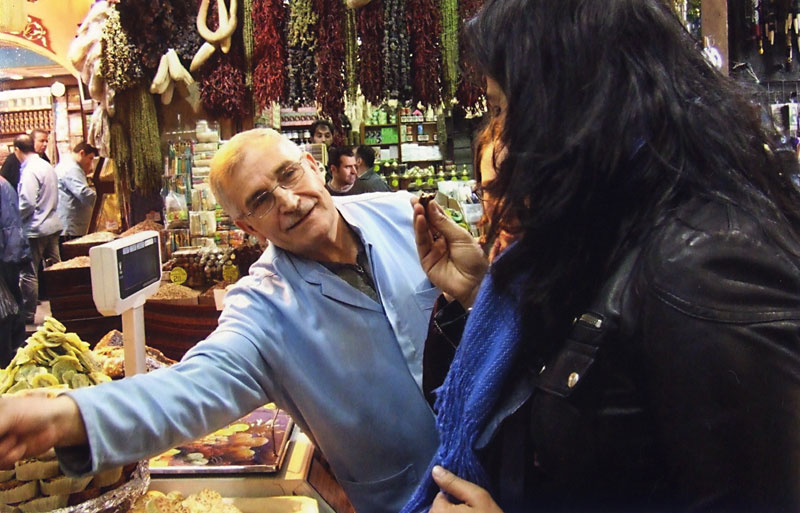
|
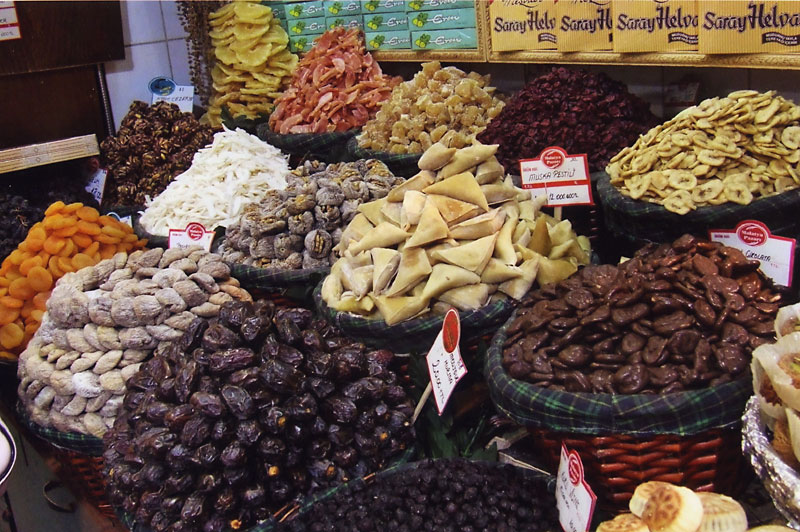
|
His son was also extremely friendly and not at all sleazy; both treated us like queens while the rest of the staff and shoppers looked on in amusement. We did find our salep at a decent price, and also bought jars of sour pomegranate syrup called pekmez to use as salad dressing. The staff happily vacuum-packed all our goodies for easier travel. We were each weighed down with all the treats we purchased.
The best delicacy at Malatya Pazari was the most unusual: dried chickpeas in a coffee-flavored candy shell. We ate more than our fair share of free samples, but then each bought several bags' worth. On my last day Kip assigned me to return to the shop for more. Cemal and his son were delighted to see me, showered me with hugs and kisses and tea, sent me off with my candied chickpeas and several pretty gift bags and ribbons, making me promise to return soon. I hope to keep that promise.
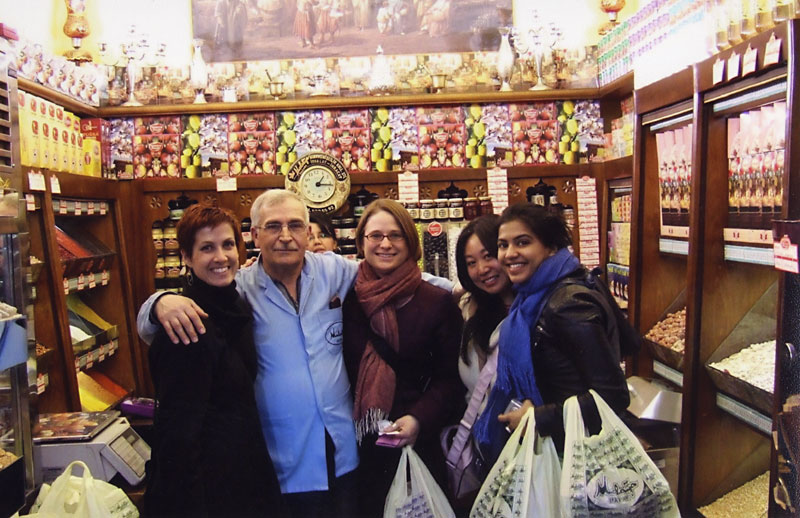
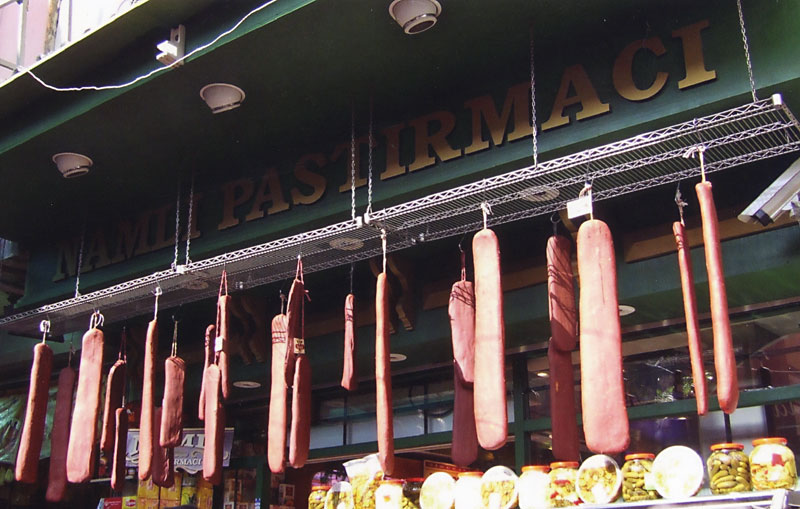 • Namli Pastirma (website is Turkish only). Walking straight through the Spice Bazaar to the exit at the "L"'s corner, we found Hasırcılar Street, filled with more aromatic spice stalls, an extremely popular coffee seller, and Namli, a gourmet deli. This shop was one of the more frustrating because we were dying to buy the gorgeous cured meats and raw-milk cheeses but weren't sure we could bring them back through customs.
• Namli Pastirma (website is Turkish only). Walking straight through the Spice Bazaar to the exit at the "L"'s corner, we found Hasırcılar Street, filled with more aromatic spice stalls, an extremely popular coffee seller, and Namli, a gourmet deli. This shop was one of the more frustrating because we were dying to buy the gorgeous cured meats and raw-milk cheeses but weren't sure we could bring them back through customs.
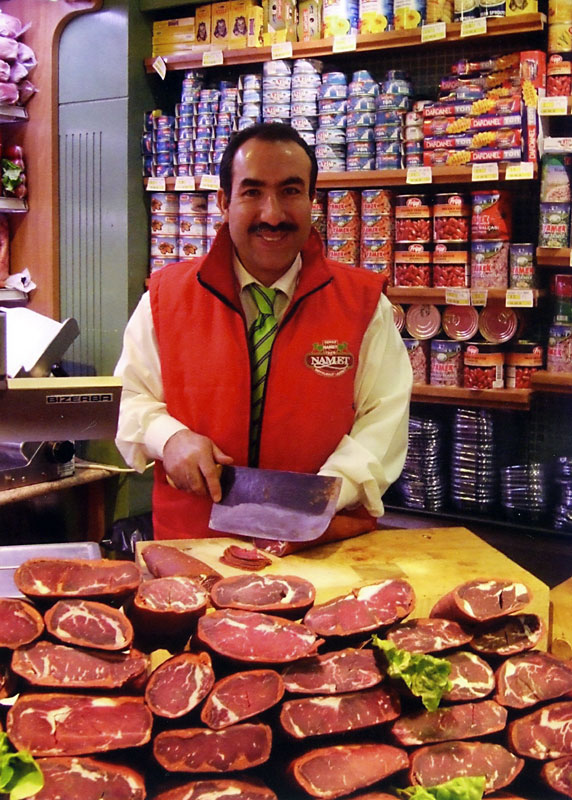 Instead, we ate lunch there. The ground floor is the meat and cheese lover's paradise, and there are two floors of seating upstairs. A smiling man behind a mouthwatering display of salami, sausages and pastirma—a dry version of pastrami—happily sliced up whatever we wanted to sample. Everything full-flavored, smoky, sliced razor thin. We ordered 2 giant sandwiches made with different house-made meats and cheeses, as well as a salad dressed in tangy, sour pomegranate pekmez. Perfectly filling for 4.
Instead, we ate lunch there. The ground floor is the meat and cheese lover's paradise, and there are two floors of seating upstairs. A smiling man behind a mouthwatering display of salami, sausages and pastirma—a dry version of pastrami—happily sliced up whatever we wanted to sample. Everything full-flavored, smoky, sliced razor thin. We ordered 2 giant sandwiches made with different house-made meats and cheeses, as well as a salad dressed in tangy, sour pomegranate pekmez. Perfectly filling for 4.
• Turkish Delight. Turkish delight, or lokum, is available everywhere in Istanbul but two shops in particular are absolute candy wonderlands.
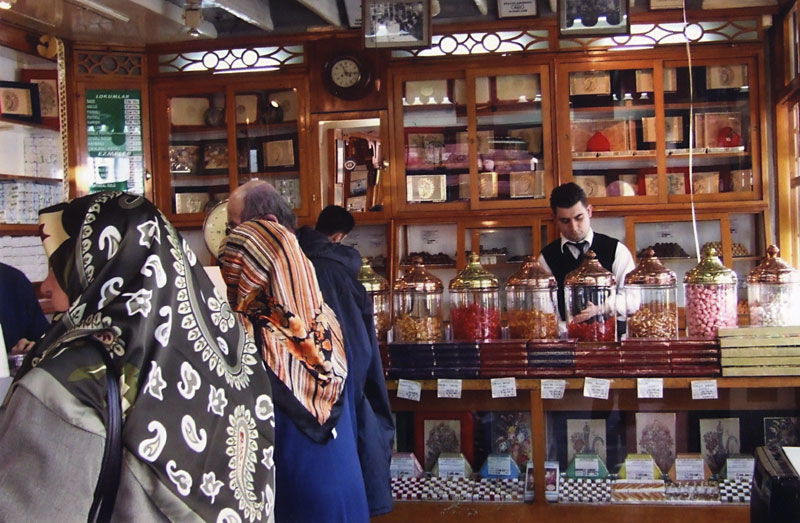 The most renowned Turkish Delight shop is Haci Bekir, which has a few outposts, and is named after candy's inventor. We visited the shop in Eminönü on Hamidiye Street, which is lovely, quiet, and lined with dark wood—a sedate candy shopping experience. The lokum (Turkish delight) is delicious and varied—I was so pleased. to find coffee-flavored lokum as one of the many options. This store is known as Haci Bekir's "living museum," as one of the oldest sweetshops in Turkey (est. 1777) and managed by descendants of Haci Bekir himself.
The most renowned Turkish Delight shop is Haci Bekir, which has a few outposts, and is named after candy's inventor. We visited the shop in Eminönü on Hamidiye Street, which is lovely, quiet, and lined with dark wood—a sedate candy shopping experience. The lokum (Turkish delight) is delicious and varied—I was so pleased. to find coffee-flavored lokum as one of the many options. This store is known as Haci Bekir's "living museum," as one of the oldest sweetshops in Turkey (est. 1777) and managed by descendants of Haci Bekir himself.
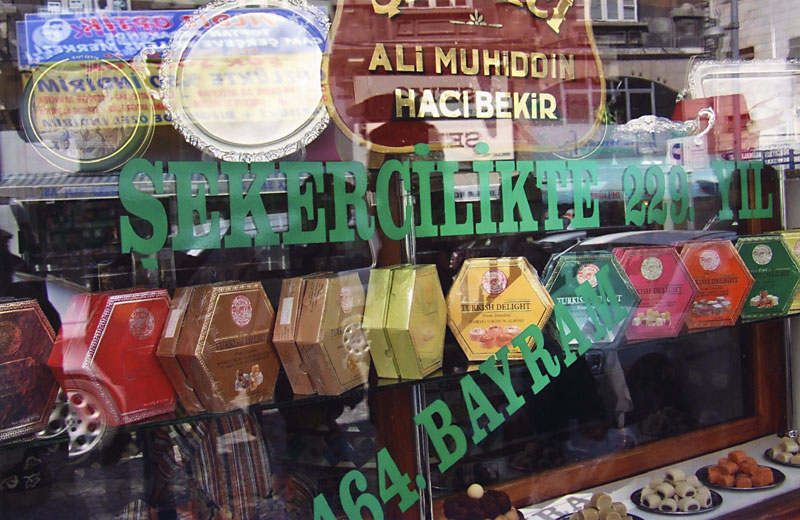
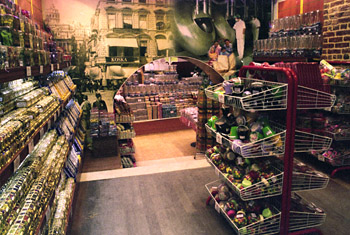 Koska is a company known more for halvah than Turkish delight, but its large outpost in Beyoğlu on Istiklal street had every type of sweet we could possibly want. One of my favorites for last-minute food items on my first Istanbul visit, the store lines its windows with various halvahs, marzipan balls and Turkish delight. The staff is extremely friendly and happy to entice customers with free tastes. In addition to candy they also stock tea and sweet groceries like honey, jam and hazelnut spread.
Koska is a company known more for halvah than Turkish delight, but its large outpost in Beyoğlu on Istiklal street had every type of sweet we could possibly want. One of my favorites for last-minute food items on my first Istanbul visit, the store lines its windows with various halvahs, marzipan balls and Turkish delight. The staff is extremely friendly and happy to entice customers with free tastes. In addition to candy they also stock tea and sweet groceries like honey, jam and hazelnut spread.
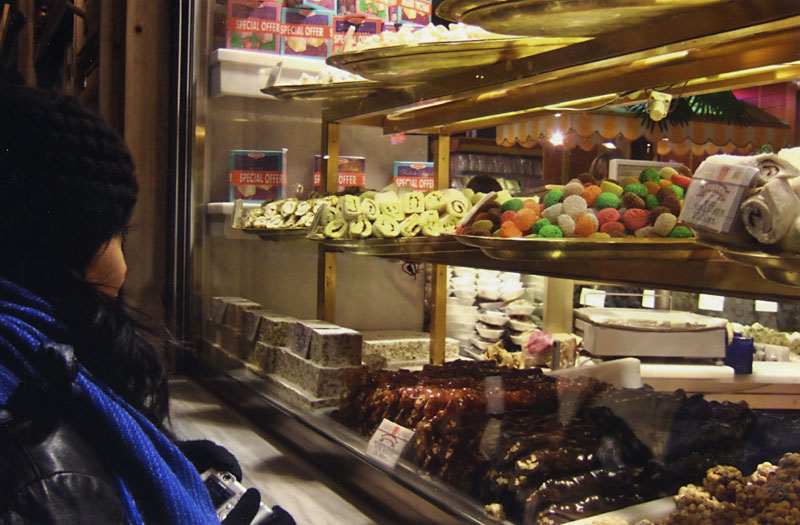
Both shops have multiple branches, with addresses listed on their websites. Koska is much more fun than Haci Bekir, but Haci Bekir's packaging is better if buying gifts.